
English - 2
003-2707-99
© Midmark Corporation 2016 TP202 20-42-FO-00014 Rev A1 C2169
MA616300i
Model / Serial Number:
Date of Purchase:
Authorized Service Company:
Dealer :
Product Information
Model / Serial
Number Label
Serial Number

English - 3
003-2707-99
© Midmark Corporation 2016 TP202 20-42-FO-00014 Rev A1 C2169
Table of Contents
Important Information
Safety Instructions ...........................................4
Intended Use....................................................4
Electromagnetic Interference ...........................4
Safety Symbols ................................................4
Shipping Symbols ............................................5
Transportation / Storage Conditions ................5
Accessories......................................................5
Included with Sterilizer .....................................6
Component Location ........................................ 7
Controls and Indicators ....................................8
Sterilization Monitoring Guidelines.................10
Installation
Operating Environment .................................. 11
Location Requirements .................................. 11
Electrical Requirements .................................12
Connecting the Power Cord ........................... 13
Operation
Before Operating the Sterilizer.......................14
Filling the Reservoir .......................................14
Qualication Testing ....................................... 15
Guidelines for Loading ...................................15
Cycle Parameters ..........................................19
Cycle Operation .............................................20
Post Sterilization Processing .........................23
Unloading Hot Trays and Cassettes ..............24
Programmable Cycle Buttons ........................26
Maintenance
Maintenance Messages .................................28
Daily Maintenance .........................................29
Weekly Maintenance ......................................30
Monthly Maintenance ..................................... 32
Extended Use Maintenance ........................... 34
Printer (optional)
Operating the Printer......................................35
Power-Up Message .......................................35
Printer Tape Description ................................35
Example of Typical Printout
of a Program Cycle ......................................36
Ribbon Cartridge Replacement......................37
Paper Roll:
Removal ..................................................... 37
Installation .................................................. 38
Troubleshooting
Troubleshooting Chart ....................................39
Informational Messages ................................. 40
Error Messages..............................................40
Calling for Service .......................................... 42
Specications / Compliance
Specications Chart:
M9 ..............................................................43
M11 ............................................................44
Water Purity Specications ............................45
Warranty Information
Scope of Warranty .........................................46

English - 4
003-2707-99
© Midmark Corporation 2016 TP202 20-42-FO-00014 Rev A1 C2169
Important Information
Safety Instructions
The primary concern of Midmark is that this equipment is operated and maintained with the safety of the
patient and staff in mind. To assure safe and reliable operation:
•Readandunderstandthismanualbeforeattemptingtoinstalloroperatethesterilizer.
•Assurethattheappropriatepersonnelareinformedonthecontentsofthismanual.
(This is the responsibility of the purchaser).
•Assurethatthismanualislocatednearthesterilizer,orifpossible,permanentlyafxed
to the sterilizer.
Intended Use
TheM9/M11UltraclaveorM9DAutoclavecanbeusedinmedicalanddentalofces,hospitals,clinics,
nursinghomes,laboratories,andotherfacilitiestosterilizeheatandmoisturestablereusableitems(includ-
ing dental handpieces) that are compatible with steam sterilization. Refer to ‘Loading Trays’ and ‘Standard
Cycle Parameters’ later in this manual for detailed information.
Electromagnetic Interference
Thissterilizerisdesignedandbuilttominimizeelectromagneticinterferencewithotherdevices.However,if
interference is noticed between another device and this product:
• Removeinterferingdevicefromroom
• Plugsterilizerintoisolatedcircuit
• Increaseseparationbetweensterilizerandinterferingdevice
• ContactMidmarkifinterferencepersists
Safety Symbols
WARNING
Indicates a potentially hazardous situation which could result in serious injury.
Caution
Indicates a potentially hazardous situation which may result in minor or moderate injury.
It may also be used to alert against unsafe practices
Equipment Alert
Indicates a potentially hazardous situation which could result in equipment damage.

English - 5
003-2707-99
© Midmark Corporation 2016 TP202 20-42-FO-00014 Rev A1 C2169
Shipping Symbols
Proper shipping orientation
Fragile
Caution Shipping Damage
Max.stackingheight
(Refer to “n” number on package)
Keep dry
Accessories
Unlessnoted,accessorycanbeusedontheM9andM11.
Accessory Name Order Number
Speed-Clean, 1 (16oz. [.47 liter]) bottle 002-0396-00
Speed-Clean, 1 case (12 - 16oz. [.47 liter]) bottles 002-0396-05
Printer 9A259001
Printer rell kit (includes 1 printer cartridge & 1 paper roll) 002-0371-00
Cassette Rack (Horizontal) 9A215001 (M11 only)
Cassette Rack (Vertical) 9A215002 (M11 only)
Pouch Rack 9A226001
Tray / Cassette Tool 9A307001
Transportation / Storage Conditions
Equipment Alert
Water must be drained from the unit’s reservoir before transporting / storing below +32° (0°C).
Ambient Temperature Range: -22°F to 140°F (-30°C to +60°C)
Relative Humidity: 10% to 90% (non-condensing)
Atmospheric Pressure: 7.2 psia to 15.4 psia (49.6 kPa to 106.4 kPa)

English - 6
003-2707-99
© Midmark Corporation 2016 TP202 20-42-FO-00014 Rev A1 C2169
Included with Sterilizer
Power Cord
Speed-Clean
2 Small Trays
2 Large Trays
Speed-Clean SDS SheetCare / Operation Card

English - 7
003-2707-99
© Midmark Corporation 2016 TP202 20-42-FO-00014 Rev A1 C2169
SA1775i
Component Location
Pressure Relief
Valve Test Lever
Printer (optional)
Display / Touch Pad
Tray Rack
Door Gasket
Dam Gasket
Tray(s)
Water Level Indicator /
Reservoir Drain Tube
Tray Plate
Fill Opening

English - 8
003-2707-99
© Midmark Corporation 2016 TP202 20-42-FO-00014 Rev A1 C2169
Controls & Indicators
Thesterilizercontrolsandindicatorsareshownintheillustrationsonthis,andthefollowingpage.
The accompanying tables describe the function of each control / indicator.
Control Function
Display see illustration Indicatescycleselected,cycletemperatureandexposuretime
fortheselectedcycle.Duringthecycle,displayshowsmessages
describingstatusofcycle.Whencycleenterssterilizationmode,
remaining cycle time is displayed as well as temperature and
pressure. Display also shows error message if a malfunction
occurs. Refer to the Troubleshooting section of this manual for a
detailedexplanationof Informational / Error Messages.
Unwrapped button
A program cycle designed to process unwrapped instruments at:
270° F (132° C) for 3:00 minutes / 30 minute drying cycle.
Pouches button
A program cycle designed to process instruments in combination
paper / plastic sterilization pouches or wrapped instruments
at: 270° F (132° C) for 5 minutes / 30 minute drying cycle.
Packs button
A Program cycle designed to process packs of instruments or
textilesat:250° F(121° C) for 30 minutes / 30 minute drying
cycle.
Handpieces
button
A program cycle for dental handpieces which runs at:
270° F(132° C) for 6 minutes / 30 minute drying cycle.
Start button
Initiatesselectedprogramor,whenSELECTCYCLEisdisplayed,
pressing Start will activate heater for 10 minutes.
Stop button
Terminates selected program or function.
1 or 2 buttons
NOTE: All material
run in these cycles
must be validated
for sterilization by
the user.
Programmable cycle buttons that allows an operator to create two
different programmed cycles for special applications. Sterilization
timeandtemperature,alongwithdryingtimeandventingproce-
dure can be adjusted or changed.

English - 9
003-2707-99
© Midmark Corporation 2016 TP202 20-42-FO-00014 Rev A1 C2169
Controls & Indicators - continued
Control Function
P button Programming mode button that allows operator to
changetemperature,time,drytimeand/orventing
procedure. Used in conjunction with buttons 1 or 2.
(Refer to Programming Mode).
+ (plus) button
Allowstemperature,time,ordrytimetobe
increased or changes Vent to Fast mode when in
location 1 or 2 and the P (programming) mode is
activated.
- (minus) button
Allowstemperature,time,ordrytimetobe
decreased or changes Vent to Slow mode when
in location 1 or 2 and the P (programming) mode is
activated.
Door Handle refer to illustration For latching / opening door.
WaterLevelIndicator/
Reservoir Drain Tube refer to illustration
Shows amount of water in reservoir. Tube also
used for drainage of reservoir into suitable
container.
Fill Opening refer to illustration Accessforllingreservoirwithwater.
PressureReliefValveTestLever refer to illustration Allows operator to check pressure relief valve.
Printer (Optional) refer to illustration The printer (optional equipment) can be used to
provideapermanentrecordoftime,temperature,
and pressure during a cycle.
Fill Opening
Water Level Indicator &
Reservoir Drain Tube
Door Handle
Printer
(optional)
Pressure Relief
Valve Test Lever

English - 10
003-2707-99
© Midmark Corporation 2016 TP202 20-42-FO-00014 Rev A1 C2169
Sterilization Monitoring Guidelines
Physical Monitors
Temperature and pressure measuring devices can help detect sterilizer malfunctions. The sterilizer’s control
system aborts the cycle and displays a message if physical conditions go outside established limits. The
optionalprintercanbeusedtocreatearecordofeachload’sactualcycletime,temperature,andpressure.
Chemical Indicators
Chemical indicators are designed to verify that conditions in the sterilizer chamber were adequate to achieve
sterilization.Theydonotvalidatethataprocesseditemissterile.Ifachemicalindicatorshowsafailure,
items in that load are considered non-sterile. Potential causes for sterilization failure include: improper
cleaning,packing,loading,orasterilizermalfunction.Determinethecauseofanysterilizationfailure,and
remedythesituationbeforerunningthenextcycle.OnlyFDAclearedchemicalindicatorslabeledforuse
withthenontraditionalsteamsterilizationcycleparameters.e.g.temperatureandexposuretime,ofthe
M9 / M11 Sterilizers should be used for monitoring the cycles. Follow the chemical indicator’s instructions
forproperstorage,use,interpretation,anddisposal.
Biological Indicators
Biological indicators are microbiological devices designed to accompany items being sterilized to monitor
adequacyofthesterilizationprocess.Ifabiologicalindicatorshowsafailure,itemsinthatloadare
considerednon-sterile.Potentialcausesforsterilizationfailureinclude:impropercleaning,packing,loading,
orasterilizermalfunction.Determinethecauseofanysterilizationfailure,andremedythesituationbefore
runningthenextcycle.OnlyFDAclearedbiologicalindicatorslabeledforusewiththenontraditional
steamsterilizationcycleparameters.e.g.temperatureandexposuretime,oftheM9/M11Sterilizers
shouldbeusedformonitoringthecycles.Followthebiologicalindicatorsinstructionsforproperstorage,
use,interpretation,anddisposal.
Note
This information below is provided for reference only. Contact appropriate state/local agencies for
specific sterilization guidelines for your office. Additional information on infection control is available
from the Centers for Disease Control and Prevention (CDC), Organization for Safety and Asepsis
Procedures (OSAP) ), Association for the Advancement of Medical Instrumentation (AAMI), and
Association for Professionals in Infection Control and Epidemiology (APIC).
Note
Use only FDA cleared chemical & biological indicators designed for steam sterilization that are
compatible with the particular sterilization cycle temperature and exposure time being monitored.
Use sterility monitors with each sterilization load. If a sterilizing cycle is terminated prematurely,
reprocess instruments to ensure sterility of the load. Follow manufacturer’s instructions for proper
disposal of used indicators.

English - 11
003-2707-99
© Midmark Corporation 2016 TP202 20-42-FO-00014 Rev A1 C2169
Installation
Operating Environment
Equipment Alert
Allow unit to reach room temperature before operating.
Failure to do so may result in damage to sterilizer.
Ambient Temperature Range: 68°F to 104°F (+20°C to +40°C)
Relative Humidity: < 80% (non-condensing)
(Pollution Degree 2, in accordance to IEC664)
Normal Operating Altitude: < 9842 ft. (3000 m) above sea level
Device approved for INDOOR USE ONLY.
Device to be operated in a relatively dust-free environment.
(Pollution Degree 2, in accordance to IEC664)
Device should be connected to a power source with over-voltage limits less than 1500 watts from
mains to ground. (Installation Category II in accordance to IEC664)
The M9 and M11 will emit 5000 BTU / HR during operation.
Location Requirements
Allow Clearance
on Both Sides
2"
(5 cm)
Clearance
21"
(53 cm)
Support Surface
1"
(3 cm)
5"
(13 cm)
Requirements
5"
(13 cm)
18"
(46 cm)
M11
M9
M11
23" (58 cm)
M9
22" (56)
2"
(5 cm)
Overhang/Shelf
M9
18"
(46 cm)
M11
15"
(38 cm)

English - 12
003-2707-99
© Midmark Corporation 2016 TP202 20-42-FO-00014 Rev A1 C2169
Support Surface
•Materialshouldbewater-resistantmaterial.(Ex.laminate,stainlesssteel,stone,etc.)
•Surfacemustbeleveltoensurechamberllswithcorrectwaterlevel.
Improperwaterlevelinthechambercouldcauseasterilizermalfunction.
•Surfaceshouldmeetminimumdimensionslistedbelow:
Dimensions
Depth (front to back) M11 - 21” (53 cm) M9 - 18” (46 cm)
Clearance Requirements
Toensureproperaircirculation,andtoallowaccesstothereservoirllportanddraincoupling,
adheretotheminimumclearancerequirementslistedbelow.Ifthesterilizerwillbeoperated
incontinuouscycles,locatesterilizerwheresteamwillnotdamagematerialsorequipmentin
the surrounding area.
Back of Unit - Back Wall ................................. 2” (5 cm)
Front Support Surface - Front Sterilizer ........ 1” (3 cm)
Sides of Unit - Side Wall ................................ 2” (5 cm)
Distance above Unit for Printer Access .......... 5” (13 cm)
MaximumUpperCabinetShelfOverhang ..... M11 - 18” (46 cm) M9 - 15” (38 cm)
Under Cabinet or Shelf................................... M11 - 23” (58 cm) M9 - 22” (56 cm)
Relocation Requirements for Sterilizer
Disconnect power cord from electrical outlet and allow sterilizer to cool.
Drainwaterfromreservoirordonottipsterilizer,allowingwatertospill.
Installation
Location Requirements continued...
WARNING
For 115 VAC models: Use 104 - 127 VAC, 50/60 Hz alternating current only.
For 230 VAC models: Use 207 - 253 VAC, 50/60 Hz alternating current only.
Failure to do so may result in electric shock to personnel and / or damage to sterilizer.
Note
For safety, the unit must be connected to a properly polarized and grounded receptacle. Always use a
power cord with grounding connections that match the receptacles in your location.
115 VAC Unit: 115VAC,50/60Hz,12amp
DedicatedSupplyCircuit*:120VAC,50/60Hz,15amp
Max.PowerConsumption:1425Watts
230 VAC Unit: 230VAC,50/60Hz,6.5amp
DedicatedSupplyCircuit*:230VAC,50/60Hz,10amp
Max.PowerConsumption:1500Watts
* Power source must have over-voltage limits less than 1500 watts from mains to ground.
(Installation Category II in accordance to IEC664)
Electrical Requirements

English - 13
003-2707-99
© Midmark Corporation 2016 TP202 20-42-FO-00014 Rev A1 C2169
Display:
WARNING
Check the serial number label on back panel of sterilizer to verify voltage rating for
the unit. Failure to connect sterilizer to an appropriate power supply could result in
damage to the unit, and electrical shock to personnel.
Voltage Rating
Connecting the Power Cord
Equipment Alert
For optimal performance, allow sterilizer to reach
room temperature before operating.
To connect the power cord...
A) Plug power cord into receptacle on back of sterilizer.
B) Plug power cord into a properly polarized and grounded receptacle rated for a
minimum of 15 amps. A dedicated circuit only used for the sterilizer is recommended.
Note: When power is connected, the messages shown below will appear on the display.
WARNING
Equipment is not suitable for use in the presence of a flammable anesthetic mixture
with oxygen, air, or nitrous oxide.
Clarification: Equipment is suitable for use in the presence of oxygen, air, or nitrous oxide.
*
* This screen will display the total number of cycles run on the unit,
the model number (M9 or M11), and the software version number.

English - 14
003-2707-99
© Midmark Corporation 2016 TP202 20-42-FO-00014 Rev A1 C2169
Operation
Before Operating the Sterilizer...
Filling the Reservoir
Caution
Programmable cycles 1 & 2 are provided for those applications requiring sterilization
parameters different than the preset cycles. All material processed in these cycles must
be validated by the user to ensure sterility of the processed load.
WARNING
Do not use this sterilizer for sterilizing volatile substances or for any purpose other
than its intended design. Burns and toxic or explosive conditions could result.
Do not force door handle at any time. Chamber pressure may cause door to open with
extreme force. If door handle does not move freely, allow until to cool and depressurize for
40 minutes before opening door. Failure to adhere could result in serious personal injury.
Do not run the sterilizer without the tray plate in place. If the sterilizer malfunctions,
immediately unplug sterilizer, and call for service; do not attempt to repair the sterilizer
yourself. Doing so could result in serious injury.
Equipment Alert
For optimal performance, allow the sterilizer to reach room temperature before operating.
To fill reservoir...
A) Open door to unit.
B) Pour distilled water into fill opening until
water level reaches the top of the fill level
label on the water level indicator tube.
Equipment Alert
Use distilled water or water that meets the
referenced water purity specifications.
Failure to comply may result in sterilizer
malfunction and/or premature failure due
to excessive corrosion.

English - 15
003-2707-99
© Midmark Corporation 2016 TP202 20-42-FO-00014 Rev A1 C2169
Qualication Testing
Yoursterilizershouldbetestedaftersterilizerinstallation,malfunctions,relocation,majorrepairs,and
aftersterilizationprocessfailure.Qualicationtestingshouldbeperformedpriortoplacingthesterilizerin
service.Ifmultiplecyclestypesareused,e.g.“Pouches”and“Packs”eachcycletypeshouldbequalied.
QualicationtestingshouldincludeatleastoneBiologicalIndicator(BI)(sometimesreferredtoasSpore
Tests)andoneChemicalIndicator(CI).Thetestpackshouldbeperformedwithitemsroutinelyprocessed
andconsideredtobethemostdifculttosterilize.Additionalitemsshouldbeplacedinthechamberalong
withtheBiologicalIndicatorandChemicalIndicatorsothatchamberisfullyloaded(don’texceedthe
maximumcapacitieslistedinthetablesunder“GuidelinesforLoading”inthismanual).Threeconsecutive
testruns,foreachcycletypetested,withnegativeresultsfromtheBIs,andtheappropriatereadingsfrom
allphysicalmonitorsandchemicalindicatorsdemonstratingcompletesterilization,providevericationthat
the sterilizer has been properly installed (or reinstalled after relocation) or repaired to the manufacturer’s
specicationsandthatitwillfunctioneffectivelyinthefacilityinwhichitisinstalled.Allitemsprocessed
duringqualicationtestingshouldbequarantineduntiltheresultsofthebiologicaltestingforallthreetest
runs are available.
Guidelines for Loading
Types of Items that can be processed in the M9 and M11
BeforeplacinganyinstrumentintheM9orM11,checkwiththeinstrumentmanufacturertobesurethe
materialsarecompatiblewithsteamsterilization,andtoverifytheacceptabilityofsterilization
parameters. The M9 and M11 are designed to sterilize the following:
• Metalinstruments
• Rubber/plasticdevices(ex. suction cannulas, impression trays, etc.)
• Wrapping/bundlingmaterials(ex. CSR wrap, instrument pouches, etc.)
• Cassettes(whichtinthesterilizertraysorthecassetterackaccessories)
• High/lowspeedhandpieces
• Surgicalinstruments(ex. opthalmologic instruments)
Equipment Alert
Do not sterilize items composed of any of the following materials in the M9 or M11.
• Corrosion sensitive metal (ex. carbon steel, iron, etc.)
• Fragile items susceptible to breaking under pressure / high temperature
• Biomedical waste
• Plastics that may break down or produce residue when exposed to steam / high
temperatures.
Examples
Polyethylene,Styrene,Cellulosics,ABS,PVC,Acrylic(Plexiglass™),PPO(Noryl™),
Latex,andNeoprene
Equipment Alert
Loadsmustbeplacedontraysatalltimes–unlesstheoptionalcassetteracksare
used–otherwise,seriousinstrumentorequipmentdamagemayoccur.

English - 16
003-2707-99
© Midmark Corporation 2016 TP202 20-42-FO-00014 Rev A1 C2169
AllitemsmustbeprocessedinaccordancewithCentersforDiseaseControlandPrevention(CDC),“Guide-
linesforInfectionControlinDentalHealthcareSettings”–2003,MMWR;52(no.RR-17),and“Guidelinesfor
DisinfectionandSterilizationinHealthcareFacilities”–2008,whichstates:
“Itemstobesterilizedshouldbearrangedtopermitfreecirculationofthesterilizingagent(e.g.,
steam,chemicalvapor,ordryheat);manufacturer’sinstructionsforloadingthesterilizershould
be followed.”
Preparing Items for Sterilization
Instrumentsmustbethoroughlycleanedtoremoveallresidualmatter,suchasdebris,disinfectant
residuals,blood,organictissue,etc.Generalcleaningguidelinesarelistedbelowbutthedevice
manufacturer’s instructions for proper cleaning and preparation of the device for sterilization should always
be followed:
•Cleaninstrumentsimmediatelyafterusetoavoiddryingofresidualmatter
•Theuseofautomatedcleaningequipment(e.g.ultrasoniccleanerorwasher-disinfector)isrecom
mended over manual cleaning for clinician safety and cleaning effectiveness.
•Aftercleaning,thoroughlyrinseinstrumentswithtapwatertoremoveanylooseneddebrisor
residualcleaninguid.Thepurityoftapwatervariessignicantlythus,it’srecommendedthenal
rinse be done with water of adequate quality to avoid instrument staining. After rinsing
instrumentsshouldbeinspectedfordamage,debris,detergentresidueandthendriedbefore
packaging.
•Iftheinstrumentmanufacturer’sinstructionsrequirelubricationoftheinstrumentsaftercleaning,
wipeoffexcesslubricantbeforepackingforsterilizationorloadingintothesterilizer.
Immediate Use Sterilization
The M9 and M11 are capable of Immediate Use sterilization - sterilizing unwrapped instruments for
immediateuse.Placeasurgicalcottontowel,papertraylinerorCSRwrapfoldedtotonthetraybottom
before putting unwrapped items in the tray. Arrange unwrapped items on the towel so they do not touch one
another (See Photo 1).
WARNING
Clean and dry instruments thoroughly before placing them into tray. Improper cleaning may
result in non-sterile instruments or damage to the unit. Follow instrument manufacturer’s
guidelines and CDC recommendations for handling and cleaning instruments prior to sterilization.
Guidelines for Loading - continued

English - 17
003-2707-99
© Midmark Corporation 2016 TP202 20-42-FO-00014 Rev A1 C2169
Photo 1
Please consider the following when choosing whether or not to sterilize your instruments unwrapped:
•Thesterilityofunwrappedinstrumentsiscompromiseduponexposuretoanon-sterile
environment.FollowCDCguidelinesforusingunwrapped,sterilizedinstruments.
•Duetothesensitivenatureofsometypesofsurgery(including,butnotlimitedto
ophthalmological),instrumentsusedinsuchproceduresmustbewrappedorpouchedinorder
toreducetheirexposuretosterilizationprocessresidues.Thewaterreservoirshouldalsobe
drainedandrelledwithfreshdistilledwateronadailybasiswhenprocessinginstrumentsfor
these procedures on a routine basis
WARNING
Do not overload the chamber! Adequate space is required around items in trays for
steam circulation and drying. Failure to allow adequate space will compromise
sterilization and drying. Items and packaging should be completely dry when removed from
the sterilizer to minimize the potential for recontamination.
General Guidelines
•UseonlyM9andM11traysintheirappropriatesterilizer.Usingothertrayscouldrestrictair/
steamowtoitemsresultingininadequatesterilizationanddrying.
•Allitemsmusttwithinthetrayandnotextendoverthelipofthesterilizertray.Instruments
must not scrape the chamber walls when sliding the tray into the chamber.
•Jointeditemsmustbesterilizedinanopenpositionsoallsurfacesareexposedtothesteam
(See Photo 2).

English - 18
003-2707-99
© Midmark Corporation 2016 TP202 20-42-FO-00014 Rev A1 C2169
Photo 2
•Handpiecesandinstrumentsmustbearrangedinasinglelayeronthetrays(notpiledor
stacked),topermitpropersteamowanddrying.
•Glasswareorutensilscapableofholdingwater,e.g.bottles,basins,beakers,etc.,shouldbe
positioned on the tray with the open side down so any water condensate drains from the
container (See Photo 3). When sterilizing glassware check with the manufacturer to make sure
it is compatible with steam sterilization.
•Rinsetubingwithdistilledwaterorwaterthatmeetsthereferencedwaterpurityspecications
and do not dry prior to sterilizing. Arrange tubing on the tray so there are no sharp bends and
the tubing ends are open and unobstructed (See Photo 4).
Photo 3
Photo 4

English - 19
003-2707-99
© Midmark Corporation 2016 TP202 20-42-FO-00014 Rev A1 C2169
•Followthedevicemanufacturer’sinstructionsfordisassemblyofmulti-partinstrumentspriorto
packaging/sterilizationtoassureallpartsareadequatelyexposedtothesteam.
•Ifitemsarebeingsterilizedandstoredforlaterusetheymustbepackaged,e.g.pouched,
wrapped,etc.,andcompletelydrywhenremovedfromthesterilizerchambertoavoidpotential
recontamination.
•Variationsinloadconguration,size,wrappingmaterials,andtheenvironmentmayrequirethe
operator to increase the default drying time to assure all packaging and instruments are
completelydry.See“CycleOperation”sectionofthismanualforinstructionsonadjustingdrying
time.
•Whensterilizingaloadthatcontainsoneormorehandpieces,utilizetheHandpiecescycle,not
the Pouches or Unwrapped Cycle.
Pouching and Wrapping Items
The M9 and M11 are capable of sterilizing pouched or wrapped items to preserve sterility after processing.
•Whenpouchingorwrappingitems,useonlysterilizationpouchesandwrapsthathavebeen
cleared by the FDA and labeled for use with the steam sterilization cycle being used. Follow the
manufacturer’s instructions for use.
•Instrumentsmadefromdifferentmaterials(stainlesssteel,carbonsteel,plastic,etc.)shouldnot
bemixedinthesamepouchorwrappedpacktoavoidpotentialinstrumentdamage.
•Pouches,wrapsandtheincludedinstrumentsshouldnottouchthechamberwalltoallowproper
steam circulation and avoid potential instrument damage.
•Forpropersteamcirculationanddryingthepreferredorientationofpouchesisrestingontheir
edge,bestaccomplishedusingtheoptionalMidmarkPouchRack9A226001.
•TheuseofthePouchRackrequirestheremovalofsomeofthesterilizertrays.Whenusingthe
Pouch Rack load a single pouch per rack slot. When using paper / plastic sterilization pouches
the pouches should be oriented in the rack so the plastic side of one pouch faces the paper side of
the adjacent pouch.
•Pouchesloadeddirectlyinthetrayswilldrybestifloadedwithplasticsideup.
•Donotlayerpouchesinthetrays.Pouchesshouldbelooselypackedwithhandpiecesand
instrumentssingleheightloaded(notpiledorstacked),topermitpropersteamowand
penetration to the items (See Photo 2).
Optional
Pouch Rack
9A226001

English - 20
003-2707-99
© Midmark Corporation 2016 TP202 20-42-FO-00014 Rev A1 C2169
•Ifpouchesorwrappedpacksarelabeledusingamarkingpentheinkshouldbenontoxic.On
paper-plastic pouches only mark on the plastic side of the pouch. On wrapped packs mark the
labeling information on the indicator tape or apply a separate label.
ShownbelowaresomerecommendedpouchloadcongurationsfortheM9(Photo5&6)and
M11(Photo7&8):
M9 Pouches on Trays
Photo 5
M9Pouchesw/PouchRack&Trays
Photo 6
M11 Pouches on Trays
Photo 7
M11Pouchesw/PouchRack&Trays
Photo 8
•WhenusingcassettesintheM9/M11,followthecassettemanufacturer’sinstructionsforuse.
•Donotwrapitemstootightly.Sterilizationcanbecompromisedifanitemisexcessively
wrapped and the wrap is more likely to tear if wrapped too tightly.
•Cassettescanbeloadedonthetraysbuttheymusttwithintheboundariesofthetrayandthey
shouldnottoucheachother,thetrayabove,orthechamberwalltoallowpropersteam
circulation.Thetotalinstrumentload,includingthecassettes,shouldnotexceedthelimitslisted
inmaximumcapacitiestables.
•WhenusingtheoptionalHorizontalandVerticalcassetteracks(9A215001&9A215002)inthe
M11 additional dry time may be required.
La page est en cours de chargement...
La page est en cours de chargement...
La page est en cours de chargement...
La page est en cours de chargement...
La page est en cours de chargement...
La page est en cours de chargement...
La page est en cours de chargement...
La page est en cours de chargement...
La page est en cours de chargement...
La page est en cours de chargement...
La page est en cours de chargement...
La page est en cours de chargement...
La page est en cours de chargement...
La page est en cours de chargement...
La page est en cours de chargement...
La page est en cours de chargement...
La page est en cours de chargement...
La page est en cours de chargement...
La page est en cours de chargement...
La page est en cours de chargement...
La page est en cours de chargement...
La page est en cours de chargement...
La page est en cours de chargement...
La page est en cours de chargement...
La page est en cours de chargement...
La page est en cours de chargement...
La page est en cours de chargement...
La page est en cours de chargement...
La page est en cours de chargement...
La page est en cours de chargement...
La page est en cours de chargement...
La page est en cours de chargement...
La page est en cours de chargement...
La page est en cours de chargement...
La page est en cours de chargement...
La page est en cours de chargement...
La page est en cours de chargement...
La page est en cours de chargement...
La page est en cours de chargement...
La page est en cours de chargement...
La page est en cours de chargement...
La page est en cours de chargement...
La page est en cours de chargement...
La page est en cours de chargement...
La page est en cours de chargement...
La page est en cours de chargement...
La page est en cours de chargement...
La page est en cours de chargement...
La page est en cours de chargement...
La page est en cours de chargement...
La page est en cours de chargement...
La page est en cours de chargement...
La page est en cours de chargement...
La page est en cours de chargement...
La page est en cours de chargement...
La page est en cours de chargement...
La page est en cours de chargement...
La page est en cours de chargement...
La page est en cours de chargement...
La page est en cours de chargement...
La page est en cours de chargement...
La page est en cours de chargement...
La page est en cours de chargement...
La page est en cours de chargement...
La page est en cours de chargement...
La page est en cours de chargement...
La page est en cours de chargement...
La page est en cours de chargement...
La page est en cours de chargement...
La page est en cours de chargement...
La page est en cours de chargement...
La page est en cours de chargement...
La page est en cours de chargement...
La page est en cours de chargement...
La page est en cours de chargement...
La page est en cours de chargement...
La page est en cours de chargement...
La page est en cours de chargement...
La page est en cours de chargement...
La page est en cours de chargement...
La page est en cours de chargement...
La page est en cours de chargement...
La page est en cours de chargement...
La page est en cours de chargement...
La page est en cours de chargement...
La page est en cours de chargement...
La page est en cours de chargement...
La page est en cours de chargement...
La page est en cours de chargement...
La page est en cours de chargement...
La page est en cours de chargement...
La page est en cours de chargement...
La page est en cours de chargement...
La page est en cours de chargement...
La page est en cours de chargement...
La page est en cours de chargement...
La page est en cours de chargement...
La page est en cours de chargement...
La page est en cours de chargement...
La page est en cours de chargement...
La page est en cours de chargement...
La page est en cours de chargement...
La page est en cours de chargement...
La page est en cours de chargement...
La page est en cours de chargement...
La page est en cours de chargement...
La page est en cours de chargement...
La page est en cours de chargement...
La page est en cours de chargement...
La page est en cours de chargement...
La page est en cours de chargement...
La page est en cours de chargement...
La page est en cours de chargement...
La page est en cours de chargement...
La page est en cours de chargement...
La page est en cours de chargement...
La page est en cours de chargement...
La page est en cours de chargement...
La page est en cours de chargement...
La page est en cours de chargement...
La page est en cours de chargement...
La page est en cours de chargement...
La page est en cours de chargement...
La page est en cours de chargement...
La page est en cours de chargement...
La page est en cours de chargement...
La page est en cours de chargement...
La page est en cours de chargement...
La page est en cours de chargement...
La page est en cours de chargement...
La page est en cours de chargement...
La page est en cours de chargement...
La page est en cours de chargement...
La page est en cours de chargement...
La page est en cours de chargement...
La page est en cours de chargement...
-
 1
1
-
 2
2
-
 3
3
-
 4
4
-
 5
5
-
 6
6
-
 7
7
-
 8
8
-
 9
9
-
 10
10
-
 11
11
-
 12
12
-
 13
13
-
 14
14
-
 15
15
-
 16
16
-
 17
17
-
 18
18
-
 19
19
-
 20
20
-
 21
21
-
 22
22
-
 23
23
-
 24
24
-
 25
25
-
 26
26
-
 27
27
-
 28
28
-
 29
29
-
 30
30
-
 31
31
-
 32
32
-
 33
33
-
 34
34
-
 35
35
-
 36
36
-
 37
37
-
 38
38
-
 39
39
-
 40
40
-
 41
41
-
 42
42
-
 43
43
-
 44
44
-
 45
45
-
 46
46
-
 47
47
-
 48
48
-
 49
49
-
 50
50
-
 51
51
-
 52
52
-
 53
53
-
 54
54
-
 55
55
-
 56
56
-
 57
57
-
 58
58
-
 59
59
-
 60
60
-
 61
61
-
 62
62
-
 63
63
-
 64
64
-
 65
65
-
 66
66
-
 67
67
-
 68
68
-
 69
69
-
 70
70
-
 71
71
-
 72
72
-
 73
73
-
 74
74
-
 75
75
-
 76
76
-
 77
77
-
 78
78
-
 79
79
-
 80
80
-
 81
81
-
 82
82
-
 83
83
-
 84
84
-
 85
85
-
 86
86
-
 87
87
-
 88
88
-
 89
89
-
 90
90
-
 91
91
-
 92
92
-
 93
93
-
 94
94
-
 95
95
-
 96
96
-
 97
97
-
 98
98
-
 99
99
-
 100
100
-
 101
101
-
 102
102
-
 103
103
-
 104
104
-
 105
105
-
 106
106
-
 107
107
-
 108
108
-
 109
109
-
 110
110
-
 111
111
-
 112
112
-
 113
113
-
 114
114
-
 115
115
-
 116
116
-
 117
117
-
 118
118
-
 119
119
-
 120
120
-
 121
121
-
 122
122
-
 123
123
-
 124
124
-
 125
125
-
 126
126
-
 127
127
-
 128
128
-
 129
129
-
 130
130
-
 131
131
-
 132
132
-
 133
133
-
 134
134
-
 135
135
-
 136
136
-
 137
137
-
 138
138
-
 139
139
-
 140
140
-
 141
141
-
 142
142
-
 143
143
-
 144
144
-
 145
145
-
 146
146
-
 147
147
-
 148
148
-
 149
149
-
 150
150
-
 151
151
-
 152
152
-
 153
153
-
 154
154
-
 155
155
-
 156
156
dans d''autres langues
- English: Midmark M9-021 User guide
- español: Midmark M9-021 Guía del usuario
Documents connexes
-
Midmark M9/M11 Self -Contained Steam Sterilizer (-033 thru -034) Mode d'emploi
-
Midmark M9/M9D, M11 Self-Contained Steam Sterilizer (-040 through -042) Manuel utilisateur
-
Midmark M9-041 Manuel utilisateur
-
Midmark M9/M11 Self -Contained Steam Sterilizer (-043) Mode d'emploi
-
Midmark M9/M11 Self -Contained Steam Sterilizer (-043) Mode d'emploi
-
Midmark M3 Steam Sterilizer Mode d'emploi
-
Midmark M9/M9D, M11 Self-Contained Steam Sterilizer (-040 through -042) Mode d'emploi
-
Midmark 255 LED Procedure Light (Ritter) - Mobile Mode d'emploi
-
Midmark 354 - 355 Combination Lighting System (354-037 thru -041 - s/n: MZ, V) Mode d'emploi
-
Midmark 255 LED Procedure Light ) - Wall Mode d'emploi
Autres documents
-
Braun 42194 Manuel utilisateur
-
LG VH9500DSW Manuel utilisateur
-
Phcbi MLS-2420U Mode d'emploi
-
LG VH9200 DSW Manuel utilisateur
-
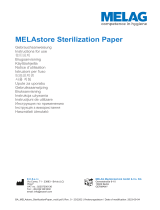 MELAG MELAstore Mode d'emploi
MELAG MELAstore Mode d'emploi
-
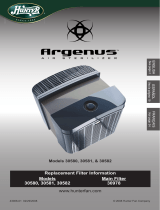 Hunter Fan 43006-01 Manuel utilisateur
Hunter Fan 43006-01 Manuel utilisateur
-
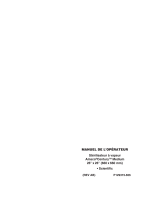 Steris Amsco Century Medium Steam Sterilizer Mode d'emploi
Steris Amsco Century Medium Steam Sterilizer Mode d'emploi
-
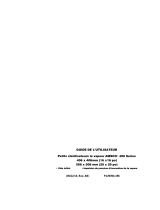 Steris Amsco 400 Series Small Steam Sterilizer Mode d'emploi
Steris Amsco 400 Series Small Steam Sterilizer Mode d'emploi
-
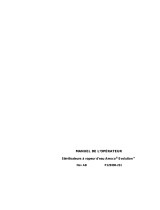 Steris Amsco Evolution Medium Steam Sterilizer Mode d'emploi
Steris Amsco Evolution Medium Steam Sterilizer Mode d'emploi
-
Gima 35581 Le manuel du propriétaire

































































































































































